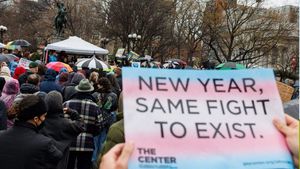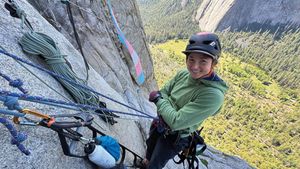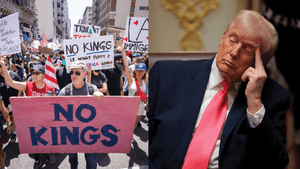
Treatment GuideJust DiagnosedSex & DatingAfrican AmericanStigmaAsk the HIV DocPrEP En EspañolNewsVoicesPrint IssueVideoOut 100
CONTACTCAREER OPPORTUNITIESADVERTISE WITH USPRIVACY POLICYPRIVACY PREFERENCESTERMS OF USELEGAL NOTICE
© 2026 Pride Publishing Inc.
All Rights reserved
All Rights reserved
By continuing to use our site, you agree to our Privacy Policy and Terms of Use.
The nation’s ongoing war on drugs leads to the spread of HIV, says a new coalition of leaders that includes a famous billionaire and a former secretary of State.
Mostly they’re worried about intravenous drug users who share needles, a habit that can spread the virus. The 22-page report from the Global Commission on Drug Policy argues that fear of jail time sends injection-drug users into an underground where they’re more likely to share a needle than risk getting a clean one from a needle exchange or other government programs. And even if needle users wanted a safer route, these needle exchange programs are increasingly hard to find in the U.S. Critics in Congress say the exchanges increase crime and send addicts the wrong message, so in 2011 lawmakers reinstated a ban on federal funding for them here and abroad.
Those signing the report include British Virgin magnate Richard Branson, six former presidents of foreign countries, former Federal Reserve chairman Paul Volcker, and George Shultz, who is a former secretary of State and of the Treasury and Labor departments.
The bipartisan group argues that the drug war only worsens the problem in the United States because inmates are at increased risk for contracting and then spreading the disease. According to Time magazine, the number of people in prison for drug charges has increased 10-fold since President Ronald Reagan began a war on drugs in the early 1980s. Today more than 50% of federal prison inmates are there on drug convictions, and 1.66 million Americans were arrested on drug charges in 2009 alone, the majority simply for possession.
According to Branson and other leaders, 25% of all Americans who are infected with HIV pass through correctional facilities each year. Those who are on medication often find treatment interrupted by their incarceration, which the group warns can lead to HIV drug resistance.
“Arresting and imprisoning nonviolent people who use drugs must end,” says Branson, who issued a statement arguing that it’s more expensive to prosecute and imprison drug users than to offer treatment. “Refusing to implement such proven public health measures that reduce HIV infection and protect people who use drugs is criminal,” he says.
From our Sponsors
Most Popular
“So much life to live”: Eric Nieves on thriving with HIV
September 03 2025 11:37 AM
The Talk: Beyond the exam room
August 13 2025 3:15 PM
Messenger RNA could be the key to an HIV vaccine — but government cuts pose a threat
August 20 2025 8:02 AM
Thanks to U=U, HIV-positive people can live long, happy, healthy lives
July 25 2025 2:37 PM
It’s National PrEP Day! Learn the latest about HIV prevention
October 10 2025 9:00 AM
Amazing People of 2025: Javier Muñoz
October 17 2025 7:35 PM
The Talk: Starting the conversation
July 25 2025 4:47 PM
The lab coat just got queer
August 21 2025 10:00 AM
The Talk: Owning your voice
August 25 2025 8:16 PM
“I am the steward of my ship”: John Gibson rewrites his HIV narrative
September 16 2025 2:56 PM
Plus: Featured Video
Latest Stories
HIV-positive men stage 'Kiss-In' protest at U.S.-Mexico border
December 01 2025 12:56 PM
What the AIDS crisis stole from Black gay men
December 01 2025 6:00 AM
The Talk: Navigating your treatment
August 01 2025 6:02 PM
How the Black AIDS Institute continues to fill in the gaps
July 25 2025 1:06 PM
“I felt like a butterfly”: Niko Flowers on reclaiming life with HIV
July 23 2025 12:22 PM
Dancer. Healer. Survivor. DéShaun Armbrister is all of the above
July 02 2025 8:23 PM
BREAKING: Supreme Court rules to save free access to preventive care, including PrEP
June 27 2025 10:32 AM
1985: the year the AIDS crisis finally broke through the silence
June 26 2025 11:24 AM
VIDEO: A man living with HIV discusses his journey to fatherhood
June 10 2025 4:58 PM
Trump admin guts $258 million in funding for HIV vaccine research
June 03 2025 3:47 PM
Grindr is reminding us why jockstraps are so sexy and iconic
May 02 2025 5:36 PM
HRC holds 'die-in' to protest Trump health care cuts
April 28 2025 2:11 PM
Two right-wing Supreme Court justices signal they may uphold access to PrEP and more
April 21 2025 4:10 PM
500,000 Children at Risk: PEPFAR Funding Crisis
April 08 2025 3:51 PM
Broadway's best raise over $1 million for LGBTQ+ and HIV causes
April 03 2025 7:15 PM
The Talk Season 5 premieres this spring with HIV guidance for the newly diagnosed
March 26 2025 1:00 PM







































































